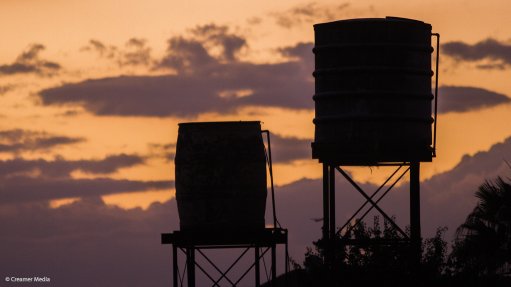
The interplay between water and energy is more critical than ever, with climate change forcing people to work together, according to World Bank energy and extractives global practice director Charles Feinstein.
“You can’t tackle energy problems without being sensitive to water demands. Global climate change is forcing us to work together on the water/energy nexus,” said Feinstein addressing several thousand power and water professionals on Wednesday at the African Utilities Week, in Cape Town,
The risk of water shortages and the large amounts of water used in energy were some of the issues that came to the fore at the conference. Some technologies, such as coal-fired power stations, were much more water-intensive than others and delegates were urged to take this into account and to diversify their energy mix.
Also addressing Utility Week delegates, United Nations- (UN-) backed sustainability initiative Sustainable Energy for All COO Monika Weber-Fahr noted that energy needs, the rise in carbon dioxide emissions and the consequent rise in global warming had driven the world to the current situation.
“We are starting to be at real risk of global warming that will induce climate change to levels we may not be able to handle. In 20 or 30 years, global warming might get to the 1.5° threshold, where climatic changes will be so dramatic that streets could start dissolving, buildings may not be strong enough and dams could break,” said Weber-Fahr.
She urged water and power professionals to work together, adding that, without access to energy and water, the UN’s 17 Sustainable Development Goals could not be achieved.
“The world community has set ambitious goals for 2030. Energy will need to fuel them. Water will need to nourish them.”
Experts in the water sector urged delegates to pay more attention to water, saying that it should not play second fiddle to energy.
“The water sector is often still seen as charity and the preserve of government,” said Nigeria-based Genesis Energy CEP Akinwole Omoboriowo.
He said this was untenable given food security and the need for water for agriculture and encouraged fellow Africans to think beyond self-interest.
“We need to think less of the African pie we can grab and concentrate more on the greater good.”
Netherlands’ International Water Affairs special envoy Henk Ovink called for a different approach to water.
“It’s a scarce resource. Ninety per cent of all disasters are water-related, 50% of Africans do not have access to clean water.” He added that the problem was heightened in Africa, where urbanisation was leading the planet and population was set to double.
“It’s a rapidly urbanising world with a lot of conflict, and water is often at the core of this conflict. If we can make the connection between energy, food, urbanisation and water, we can move from fragility to resilience,” said Ovink.
African Utility Week has been looking at the latest challenges, developments and opportunities in the water and power sectors, from clean energy, finance and investment to water supply and energy efficiency.
This year, the event attracted 250 exhibitors from around the world.